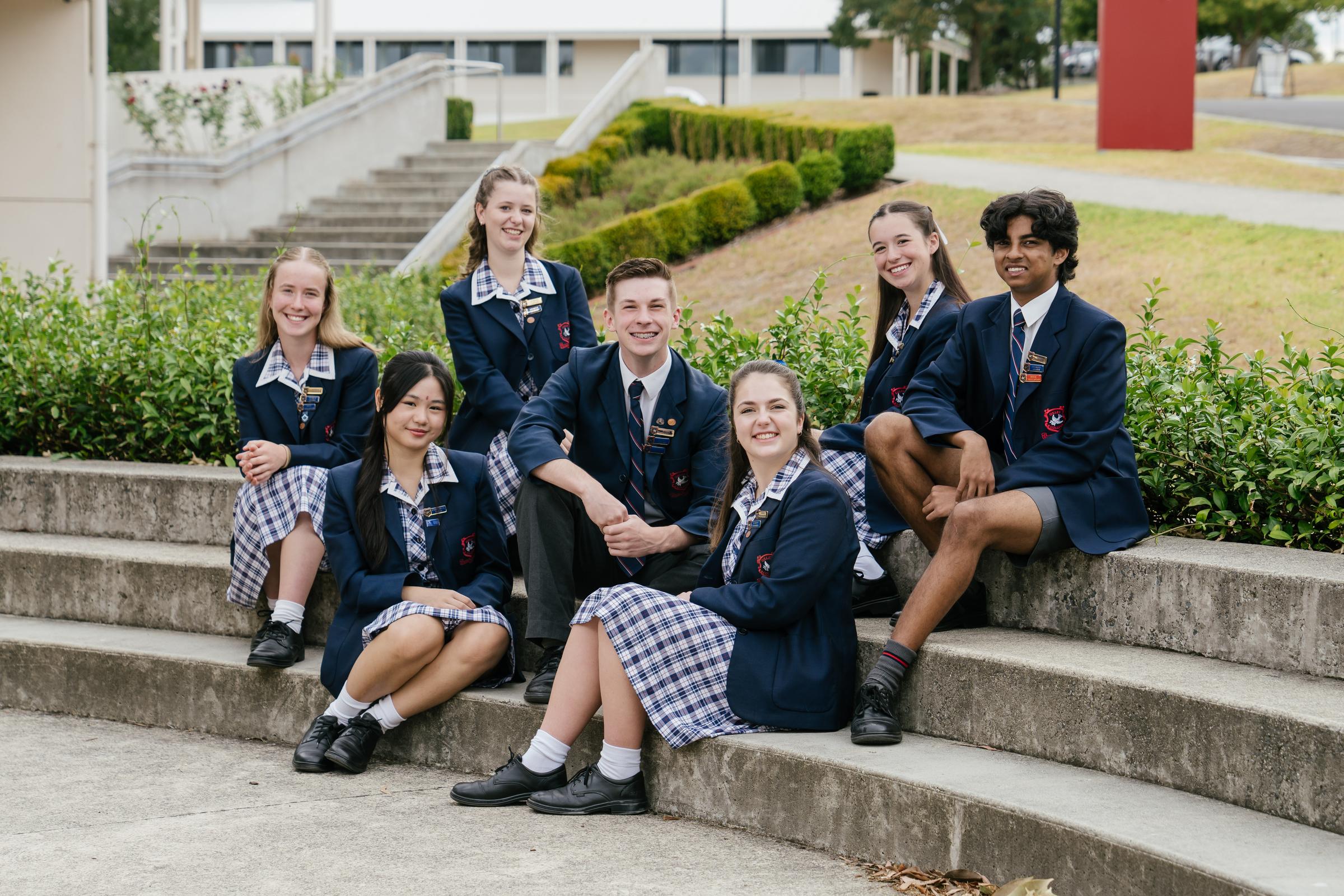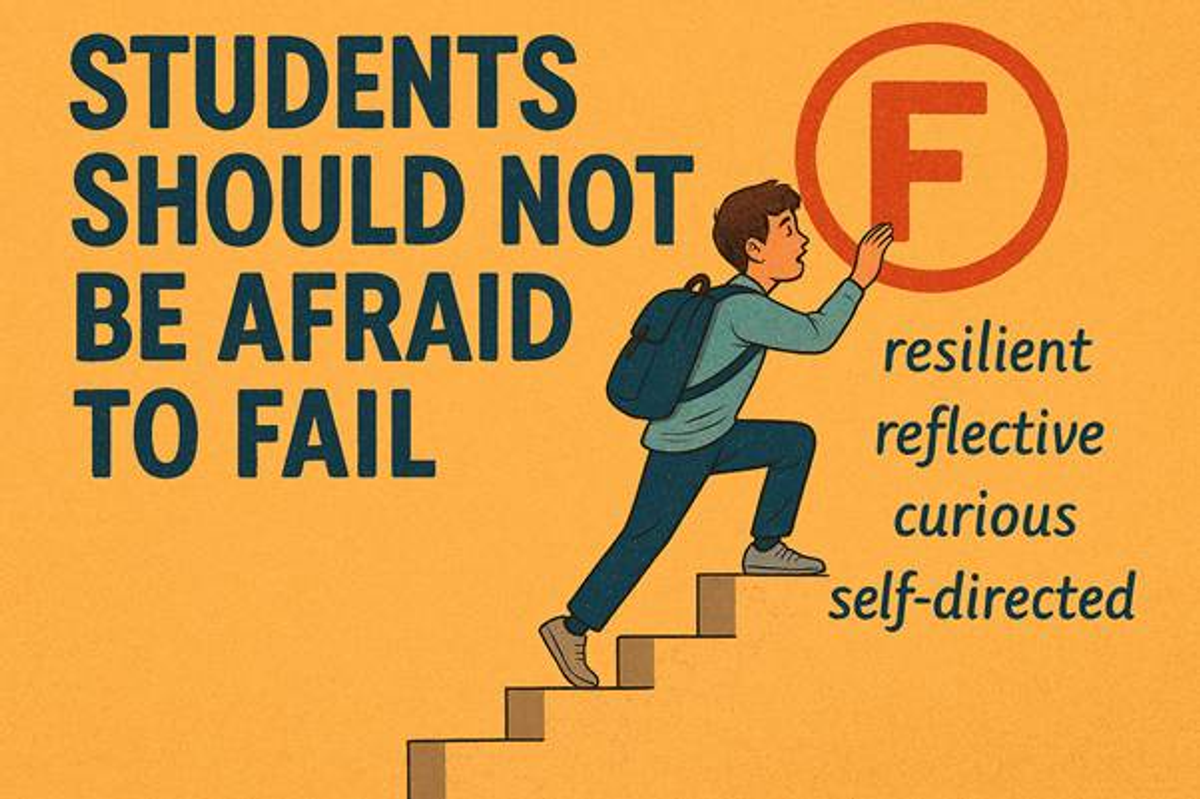Senior School

Students Should Not Be Afraid to Fail: Building Resilience, Agency, and Growth Through Setbacks
Few things can be more confronting than failure. An N on a report, when an ATAR or study score does not meet personal ambitions or expectations; when students miss the cut for a sports team, failure always stings and sometimes cuts deep. Today’s adolescents need to navigate a range of increasingly visible and demanding academic and social contexts whilst their emotional boundaries are constantly tested and expanded.
Students are pressed, challenged and assessed all throughout their formative years and can even face additional pressures from school, peers, family and media (especially social media). A growing body of research shows that students themselves are now the primary source of the pressure they feel. This shift is further driven by a work and social culture that demands success and equates achievement with a sense of personal identity. (Simmons, 2019)
Some students cope by internalising expectations about grades and future success, believing that their worth is tied to performance. Social media only serves to amplify this unremitting pressure, offering the means for constant comparisons amidst curated images of ideal performance and personal notions of “perfection”. Consequently, many adolescents may feel that they must excel not just academically, but socially and emotionally, all while maintaining an image of effortless success.
Students also often equate failure with inadequacy. The fear of falling short, whether in grades, expectations, or future aspirations, can be paralysing. Yet, failure should not be the enemy. It is a powerful teacher, a necessary step in the journey toward success, and a catalyst for resilience, curiosity, and growth. Romans 5:3-4 tells us that “Not only so, but we also glory in our sufferings, because we know that suffering produces perseverance; perseverance, character; and character, hope.”
An inability to rationalise and observe failure as an opportunity to correct and grow can be quite profound. Rates of anxiety, depression, and emotional exhaustion among teens have surged in high-achieving school environments if students lack the emotional vocabulary to express their distress. It remains incumbent on teachers and families to shift this narrative for students. Success should be defined by growth, effort, and resilience in the face of setbacks and failures. To be able to adjust to failure and progress, students need safe spaces to fail, reflect, and try again without fear of further judgment. (Weir, 2025)
1. Reframing Failure: A Gateway to Learning
When embraced, failure becomes a valuable tool for reflection and personal recalibration. Students who learn to view failure as feedback rather than defeat develop the grit and agency needed to thrive in school and beyond.
Each setback can offer students an opportunity to ask: What didn’t work? What did? What can I improve? Oxley’s Middle and Senior School teachers are required to provide feedback that outlines for students what was expected, what the student had achieved and what they need to do to develop further. This process helps to build academic capacity but also engenders a developing sense of emotional resilience and intellectual curiosity.
But everybody has a role, and passive learning is an ineffective framework for student development. John Hattie’s research on the influences on student achievement underscores this point. His findings reveal that students account for 50% of the variance in achievement, while teachers contribute 30%, and home, peers, schools, and principals each contribute 5–10%. This data highlights the central role of student agency, their mindset, effort, and personal engagement in shaping their school/learning outcomes. (Hattie, 2008)
2. The Role of the Student: Owning the Journey
Students must be empowered to take ownership of their learning. This means cultivating a mindset that welcomes challenges and sees mistakes as part of the process. Fear of failure often stems from perfectionism, low self-esteem, or a range of other external pressures. But when students understand that failure is not a verdict but a stepping stone, they begin to act with greater confidence and curiosity.
At Oxley, we believe that building resilience involves:
- Setting realistic goals and breaking them into manageable steps.
- Reflecting on setbacks to identify lessons and strategies for improvement.
- Practicing self-compassion, recognizing that everyone stumbles.
Persisting through difficulty, knowing that growth often comes from discomfort.
These are also duties that need to be modelled for students, but need to be adopted by students themselves. Students who adopt these habits are more adaptable, motivated, and capable of navigating complex academic and personal challenges.
3. The Role of the Teacher: Cultivating a Safe Space for Growth
Our teachers and support staff each play a pivotal role in shaping how students perceive failure. A classroom culture that normalises mistakes and celebrates effort fosters resilience and curiosity. When teachers model various learning journeys and provide constructive feedback, they can help students see failure as a natural and valuable part of learning.
The ongoing learning process at Oxley utilises a range of learning frameworks to enhance the student learning experience.
- Using formative assessment to guide learning rather than judge it.
- Encouraging reflection through discussion and goal-setting exercises.
- Providing differentiated support, recognising that each student’s path is unique.
- Celebrating progress, not just perfection and meeting assessment standards.
Our teachers also need to be attuned to the emotional and psychological barriers students face. Fear of disappointing others, fear of change, or fear of inadequacy can all hinder performance. By fostering trust and empathy, educators can help students confront these fears and move forward with confidence.
4. The Role of the Home: Supporting Without Pressure
While Hattie’s research shows that the home environment contributes 5–10% to student achievement, its influence is still significant, especially in shaping attitudes toward learning and failure. Parents and caregivers can support resilience by emphasising effort and the process of learning over outcomes, encouraging curiosity, and modelling a growth mindset.
Key practices can include:
- Avoiding overemphasis on grades and instead asking about what was learned.
- Sharing personal stories of failure and recovery, to normalise the experience.
- Providing emotional support, especially during challenging times.
Encouraging autonomy, allowing students to make decisions and learn from them.
A home that values learning over performance helps students develop intrinsic motivation and a sense of agency. It becomes a safe space where failure is not feared but understood.
5. Failure as a Catalyst for Capacity and Curiosity
Students who fear failure often avoid challenges, procrastinate, disengage or avoid school entirely. When failure is reframed as a learning opportunity, it sparks curiosity and builds capacity. Students begin to ask deeper questions, explore alternative strategies, and take intellectual risks. This is where true learning happens. Not in the absence of failure, but in the presence of reflection and persistence.
6. Building a Culture That Embraces Failure
To truly support students, teachers must foster a culture where failure is not stigmatised but embraced. This involves:
- Professional development for teachers.
- Curriculum design that includes opportunities for revision, reflection, and experimentation.
- Student-led initiatives that promote peer support and shared learning experiences.
Collaborative partnerships with families, to align messaging and support systems.
When students, teachers, and families work together to reframe failure, the result is a more resilient, curious, and capable learner. A true 21st century capable student who is prepared not just for academic success, but for life.
7. From Fear to Flourishing
Students should not be afraid to fail. Instead, they should be taught to see failure as a natural and necessary part of growth. By building resilience, fostering curiosity, and encouraging reflection, we empower students to take ownership of their learning and embrace the journey with confidence.
As John Hattie’s research reminds us, the greatest influence on student achievement lies within the student. But that influence is shaped by the environments we create whether it be at school, at home or in the classroom.
References
Hattie, J. (2008). Visible learning: A synthesis of over 800 meta-analyses relating to achievement. Routledge.
Simmons, A. (2019, November 20). As teen stress increases, teachers look for answers. Edutopia. www.edutopia.org/article/teen-stress-increases-teachers-look-answers
Weir, K. (2025, April 1). U.S. teens need far more emotional and social support. Monitor on Psychology, 56(3). www.apa.org/monitor/2025/04-05/teen-social-emotional-support
Term 3 Review
The past few weeks have offered students rich opportunities to grow through challenge, connection, and reflection. Whether navigating the slopes of Mt Buller, the laneways of Melbourne, or the social dynamics of a formal dinner, students have been invited to step outside their comfort zones and into experiences that build resilience, agency, and curiosity.
- In Week 5 of Term 3, Year 8 students embarked on a memorable camp to Charnwood, Nillahcootie and Mt Buller. Over four days, they engaged in bushcraft, snow skiing, snowboarding, and snow play, supported by College staff who participated alongside them. Students not only explored a unique environment but also practiced new skills and built meaningful connections with one another. The camp encouraged independence, leadership, and communication, all while deepening their appreciation for God's creation through daily devotions and shared experiences.
- Year 9 students took part in the immersive City Cite program from Monday 1 September to Friday 12 September. Based in the Melbourne CBD, students explored societal issues through excursions, collaborative inquiry, and independent travel. They began the program travelling with their Home Group teachers and later navigated the city independently, demonstrating growing autonomy and responsibility. Highlights included visits to Eureka Tower, Fareshare Australia, the Magistrates Court, and guest speakers from Victoria Police and The Big Issue. These experiences helped students develop persistence, resilience, and critical thinking as they examined real-world challenges and proposed action plans for change.
- On Friday 12 September, Year 11 students attended their annual Formal Dinner. In keeping with tradition, students were dismissed early to prepare for the evening, with the expectation that those fast-tracking a Year 12 subject remained for their afternoon classes. The event provided a joyful and elegant opportunity for students to celebrate their journey together, strengthening social bonds and marking a milestone in their senior schooling experience.
- In the last week of Term 3, the College is observing Wellbeing Week, a time dedicated to promoting help-seeking behaviours, fostering community, and educating students about mental health. This initiative supports the development of emotional literacy and encourages students to care for themselves and others.
- Families attended the City Cite Parent Presentation Night on Wednesday 17 September from 6.00–7.00pm in the Middle Years Building. Students presented findings from their inquiry projects, which explore societal issues in Melbourne through literature reviews, surveys, expert interviews, and global comparisons. This evening offered a chance to witness how students have grown in independence, resilience, and problem-solving through their city experiences. We thank you all who came to celebrate their efforts.
During the second week of the holidays, from 29 September to 3 October, Year 12 students will sit their Unit 4 VCE Practice Exams. These exams are a vital part of their preparation and reflect the College’s commitment to academic rigour and student readiness.
Further events, including dinners, presentations, assemblies, final days, and announcements for Term 4, will be shared in the first edition of The Vine for Term 4, 2025.
James Avram
Deputy Principal and Head of Secondary


